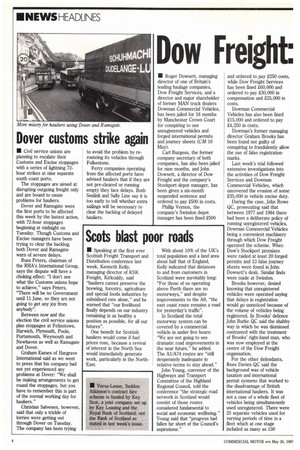Dow Freight: fines and jail
Page 6

Page 7

If you've noticed an error in this article please click here to report it so we can fix it.
• Roger Dowsett, managing director of one of Britain's leading haulage companies, Dow Freight Services, and a director and major shareholder of former MAN truck dealers Dowman Commercial Vehicles, has been jailed for 18 months by Manchester Crown Court for conspiring to use unregistered vehicles and forged international permits and journey sheets (CM 16 May).
Carl Burgess, the former company secretary of both companies, has also been jailed for nine months, and John Dowsett, a director of Dow Freight and the company's Stockport depot manager, has been given a six-month suspended sentence and ordered to pay 2500 in costs.
Phillip Vernon, the company's Swindon depot manager has been fined 2500 and ordered to pay 2250 costs, while Dow Freight Services has been fined 260,000 and ordered to pay 230,000 in compensation and 225,000 in costs.
Dowman Commercial Vehicles has also been fined 215,000 and ordered to pay 2,4,250 in costs.
Dowman's former managing director Graham Brooks has been found not guilty of conspiring to fraudulently allow the use of false registration marks.
Last week's trial followed extensive investigations into the activities of Dow Freight Services and Dowman Commercial Vehicles, which uncovered the evasion of some 235,000 in vehicle excise duty.
During the case, John Rowe QC, prosecuting said that between 1977 and 1984 there had been a deliberate policy of running unregistered vehicles, Dowman Commercial Vehicles being a convenient machinery through which Dow Freight operated the scheme. When Dow's Stockport premises were raided at least 20 forged permits and 13 false journey sheets were found in John Dowsett's desk. Similar finds were made at Swindon.
Brooks however, denied knowing that unregistered vehicles were operated saying that delays in registration would go unnoticed because of the volume of vehicles being registered. In Brooks' defence John Burke QC said the shabby way in which he was dismissed contrasted with the treatment of Brooks' right-hand man, who was now employed at the centre of the Dow Freight organisation.
For the other defendants, Rees Davies QC said the background was of vehicle taxation and international permit systems that worked to the disadvantage of British international hauliers. It was not a case of a whole fleet of vehicles being simultaneously used unregistered. There were 25 separate vehicles used for varying periods of time in a fleet which at one stage included as many as 150 Roger Dowsett (left) has been sentenced to 18 months in prison, while John Dowsett has been given a six-month suspended sentence.
vehicles.
Permits were in a very short supply and Dow Freight had circumvented what it regarded as a bureaucratic restriction in order to expand its business. It was not in Dow's mind to gain an unfair advantage over British competitors: it was seeking to compete with foreign hauliers. The haulage industry's view that these restrictions operated unfairly on British hauliers was supported by the government. Large quantities of forged permits were not used — the majority of cases involving the use of false journey sheets.
Asked about the profit element on international journeys Davies said the overall costing of an Italian journey was 21,500 including a 21/2% profit margin. A West German trip would be similar with an overall costing of 21,200 or thereabouts.
Sentencing the remaining defendants, Judge Anthony Hammond QC said that in the period concerned Dow Freight's trading profits varied between 250,000 and 2540,000. The company had chosen as a matter of policy to run certain of its vehicles without registering them in the majority of cases for a matter of months but in one case for three years and in another for five years.
In addition at least one and possibly two of those vehicles had been sold to subsequent purchasers deceiving them as to their age so that they probably paid more than the vehicles were worth. Dowman Commercial Vehicles was a willing accessory in the fraud, said the judge.
0 Both Roger Dowsett, and former director Burgess, have lodged appeals against their sentences, while Dow Freight Services and Dowman are also appealing against their fines.
Dow Freight Services' company secretary and financial director Edward Rodriguez is concerned with the sentences and says while "it is quite right that any company breaking the law should be brought to book, we do feel the prison sentences were out of proportion to the offences."
Rodriguez reports that Dow was expecting substantial financial penalties, and had prepared itself for them, but it "was not expecting custodial sentences." He stresses that the offences happened more than three years ago, and since that time there have been a number of important changes within the company.












































































